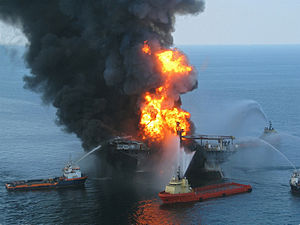 The federal Minerals Management Service gave permission to BP and dozens of other oil companies to drill in the Gulf of Mexico without first getting required permits from another agency that assesses threats to endangered species — and despite strong warnings from that agency about the impact the drilling was likely to have on the gulf.
The federal Minerals Management Service gave permission to BP and dozens of other oil companies to drill in the Gulf of Mexico without first getting required permits from another agency that assesses threats to endangered species — and despite strong warnings from that agency about the impact the drilling was likely to have on the gulf.
U.S. Said to Allow Drilling Without Needed Permits
Lawyers: Rig workers asked to sign statements
 Workers aboard an exploding offshore drilling platform were told to sign statements denying they were hurt or witnessed the blast that rocked the rig, killed 11 and spewed millions of gallons of oil into the ocean, their attorneys said Tuesday.
Workers aboard an exploding offshore drilling platform were told to sign statements denying they were hurt or witnessed the blast that rocked the rig, killed 11 and spewed millions of gallons of oil into the ocean, their attorneys said Tuesday.
U.S. agency let oil industry write offshore drilling rules
 The oil industry, not the federal agency that regulates it, plays a crucial role in writing the safety and environmental rules for offshore drilling, a role that critics say reflects cozy ties between an industry and its regulators that need to be snapped.
The oil industry, not the federal agency that regulates it, plays a crucial role in writing the safety and environmental rules for offshore drilling, a role that critics say reflects cozy ties between an industry and its regulators that need to be snapped.
Nearly 100 industry standards set by the American Petroleum Industry are included in the nation's offshore operating regulations. The API asserts that its standards are better for the industry's bottom line and make it easier to operate offshore than if the Minerals Management Service set the rules.
U.S. agency let oil industry write offshore drilling rules
 The oil industry, not the federal agency that regulates it, plays a crucial role in writing the safety and environmental rules for offshore drilling, a role that critics say reflects cozy ties between an industry and its regulators that need to be snapped.
The oil industry, not the federal agency that regulates it, plays a crucial role in writing the safety and environmental rules for offshore drilling, a role that critics say reflects cozy ties between an industry and its regulators that need to be snapped.
Gulf spill reminds America: The era of 'easy oil' is over
 To meet the world's boundless thirst for oil, drillers are searching in the sand and mud of remote western Canada, the tough shale rock of North Dakota and more than a mile under the seas off the southern U.S. coast, where a drilling accident has sent hundreds of thousands of gallons of crude spewing into the Gulf of Mexico.
To meet the world's boundless thirst for oil, drillers are searching in the sand and mud of remote western Canada, the tough shale rock of North Dakota and more than a mile under the seas off the southern U.S. coast, where a drilling accident has sent hundreds of thousands of gallons of crude spewing into the Gulf of Mexico.
Why are we going nearly to the ends of the earth and the bottom of the seas for oil?
Oil rig blowout preventers known to fail

These steel monsters known as blowout preventers or BOPs — sometimes as big as a double-decker bus and weighing up to 640,000 pounds — guard the mouth of wells. They act as the last defense to choke off unintended releases, slamming a gushing pipe with up to 1 million pounds of force.
Since spill, feds have given 27 waivers to oil companies in gulf
 Since the Deepwater Horizon oil drilling rig exploded on April 20, the Obama administration has granted oil and gas companies at least 27 exemptions from doing in-depth environmental studies of oil exploration and production in the Gulf of Mexico.
Since the Deepwater Horizon oil drilling rig exploded on April 20, the Obama administration has granted oil and gas companies at least 27 exemptions from doing in-depth environmental studies of oil exploration and production in the Gulf of Mexico.
The waivers were granted despite President Barack Obama’s vow that his administration would launch a “relentless response effort” to stop the leak and prevent more damage to the gulf. One of them was dated Friday — the day after Interior Secretary Ken Salazar said he was temporarily halting offshore drilling.
More Articles...
Page 30 of 43

 Energy Glance
Energy Glance






























